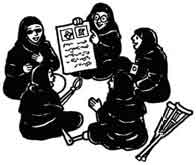Your progress
0%
Listed below are a number of activities that will help you support the formation and maintenance of self-help groups among the disabled people you serve.
Use your mouse or keyboard to expand each of the activity headings below. To add an activity to your action plan, select the Add button beside it.

Here are a number of activities that CBR programmes often undertake in working with and supporting self-help groups.

CBR can play an active role in creating self-help groups of people with disabilities and their family members.
The process of forming self-help groups will vary according to the local situation, with different levels of support required for each group.
CBR personnel can provide information about the concept of self-help groups to people with disabilities and their families and encourage them to form a group in their community. They can encourage them to identify and talk with other people in their communities who may be interested in joining and then support in organizing formal planning meetings.
In many communities, self-help groups for people with disabilities and their family members already exist and operate independently of CBR. These groups might be for people with a specific health condition or impairments, such as blindness, deafness or leprosy, or injury from landmines.. Other groups may focus on a specific topic or issue such as disability rights, income generation or women.
Other terms that may be used for “self-help groups” include
The objectives of these groups and the self-help groups initiated by CBR are often similar. Therefore it is important that CBR personnel identify and make contact with groups that currently exist in the community and develop partnerships to share knowledge and resources, and to ensure that more people with disabilities and their family members are reached
Let’s take a look at how a CBR programme in the West Bank of Palestine partnered with and supported a self-help group, and the impact that their work together had on the community.
Before you watch the video, take a moment to ask yourself what types of challenges you expect to face when partnering with a self-help group. What types of rewards do you think can be obtained? Enter your thoughts in the box below; then select Save.
While self-help groups specifically for people with disabilities and their families play an important role, CBR should also encourage people with disabilities and their families to become members of mainstream self-help groups. The following activities are suggested:
| Notes | ||
|---|---|---|
| ||
| Educate mainstream groups about the needs and potential of people with disabilitiess |
Positive role-models can contribute significantly to this effort. |
|
| Highlight common issues faced by people both with and without disabilities |
For example, facilitate a discussion about gender discrimination with a women’s group and highlight how this issue is shared by all women. |
|
| Identify existing members of mainstream self-help groups who are either disabled or have a family member who is disabled |
Encourage these people to:
|
|
| Ensure that people with disabilities and their families are informed about objectives and goals of relevant mainstream groups |
| |
Mainstream self help groups have the potential to be important resources for CBR. They cansupport CBR in identifying people with disabilities in the community or help create awareness about disability and promote inclusive development.